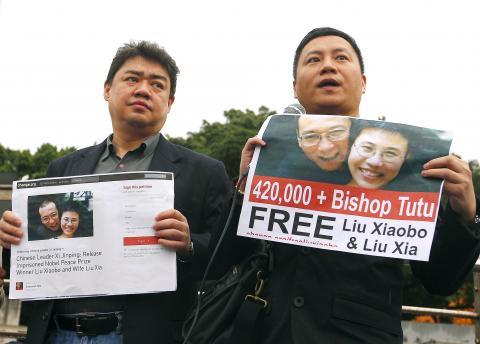As part of a globally coordinated effort to have imprisoned Chinese dissident and Nobel laureate Liu Xiaobo (劉曉波) released, exiled Chinese democracy activists Wang Dan (王丹) and Wuer Kaixi, accompanied by Taiwan Association for China Human Rights chairman Yang Hsien-hung (楊憲宏), delivered a petition signed by more than 600 Taiwanese to the Presidential Office, asking the office to forward it to the Chinese government.
Initiated by Nobel laureate Desmond Tutu in December last year, more than 400,000 people worldwide have signed the petition urging the Chinese government to release Liu immediately, and yesterday was the date set for delivery of the petitions to Chinese diplomatic posts around the world, Wuer Kaixi told a press conference in front of a monument to commemorate victims of the White Terror era on Ketagalan Boulevard in front of the Presidential Office yesterday morning.
“Today, people who are concerned about Liu and about the democratic movement in China are turning in petitions to Chinese consulates and embassies in their own countries, calling on China to release Liu,” Wuer Kaixi said. “Since there’s no Chinese representation here in Taiwan, we are turning in our petition to the Presidential Office, hoping that it will forward it to Beijing.”

Photo: Pichi Chuang, Reuters
Wuer Kaixi said that while President Ma Ying-jeou (馬英九) had once urged Beijing to set Liu free, it was unfortunate that no Chinese Nationalist Party (KMT) lawmakers had accepted his invitation to attend the event.
“However, this is an opportunity for Ma to show he really means what he said,” Wuer Kaixi said. “The difference between Taiwan and China is that we’re giving Liu our support, while China threw him in jail.”
Wang, who is a personal friend of Liu, said that Liu has always been concerned about Taiwan’s development and considers himself a friend of Taiwan, although he has never set foot in the nation.
“As a nation that stands behind the universal values of human rights, I hope that Taiwanese will not forget their obligations to help promote human rights protection around the world, including in China,” Wang said. “It’s especially important for Taiwan, because it would not be good for cross-strait exchanges if China remains a superpower in human rights violations.”
Yang said that human rights advocates were looking to push for legislation on political asylum and to amend the Act Governing Relations Between the Peoples of the Taiwan Area and the Mainland Area (台灣地區與大陸地區人民關係條例) to include clauses on human rights protection.
Separately yesterday, the Democratic Progressive Party (DPP) urged Ma to sign the petition demanding Beijing release Liu.
“Ma, as well as anyone who upholds the values of freedom, peace and democracy, should join more than 400,000 people from about 130 countries and support the petition drive,” DPP spokesperson Lin Chun-hsien (林俊憲) said.
Additional reporting by Chris Wang

AIR SUPPORT: The Ministry of National Defense thanked the US for the delivery, adding that it was an indicator of the White House’s commitment to the Taiwan Relations Act Deputy Minister of National Defense Po Horng-huei (柏鴻輝) and Representative to the US Alexander Yui on Friday attended a delivery ceremony for the first of Taiwan’s long-awaited 66 F-16C/D Block 70 jets at a Lockheed Martin Corp factory in Greenville, South Carolina. “We are so proud to be the global home of the F-16 and to support Taiwan’s air defense capabilities,” US Representative William Timmons wrote on X, alongside a photograph of Taiwanese and US officials at the event. The F-16C/D Block 70 jets Taiwan ordered have the same capabilities as aircraft that had been upgraded to F-16Vs. The batch of Lockheed Martin

GRIDLOCK: The National Fire Agency’s Special Search and Rescue team is on standby to travel to the countries to help out with the rescue effort A powerful earthquake rocked Myanmar and neighboring Thailand yesterday, killing at least three people in Bangkok and burying dozens when a high-rise building under construction collapsed. Footage shared on social media from Myanmar’s second-largest city showed widespread destruction, raising fears that many were trapped under the rubble or killed. The magnitude 7.7 earthquake, with an epicenter near Mandalay in Myanmar, struck at midday and was followed by a strong magnitude 6.4 aftershock. The extent of death, injury and destruction — especially in Myanmar, which is embroiled in a civil war and where information is tightly controlled at the best of times —

China's military today said it began joint army, navy and rocket force exercises around Taiwan to "serve as a stern warning and powerful deterrent against Taiwanese independence," calling President William Lai (賴清德) a "parasite." The exercises come after Lai called Beijing a "foreign hostile force" last month. More than 10 Chinese military ships approached close to Taiwan's 24 nautical mile (44.4km) contiguous zone this morning and Taiwan sent its own warships to respond, two senior Taiwanese officials said. Taiwan has not yet detected any live fire by the Chinese military so far, one of the officials said. The drills took place after US Secretary

THUGGISH BEHAVIOR: Encouraging people to report independence supporters is another intimidation tactic that threatens cross-strait peace, the state department said China setting up an online system for reporting “Taiwanese independence” advocates is an “irresponsible and reprehensible” act, a US government spokesperson said on Friday. “China’s call for private individuals to report on alleged ‘persecution or suppression’ by supposed ‘Taiwan independence henchmen and accomplices’ is irresponsible and reprehensible,” an unnamed US Department of State spokesperson told the Central News Agency in an e-mail. The move is part of Beijing’s “intimidation campaign” against Taiwan and its supporters, and is “threatening free speech around the world, destabilizing the Indo-Pacific region, and deliberately eroding the cross-strait status quo,” the spokesperson said. The Chinese Communist Party’s “threats